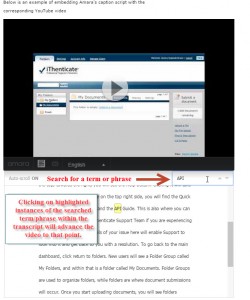Have you ever encountered a YouTube video that you’d love to use in a course but it does not have closed captions? As an instructor concerned with accessibility and search-ability, you may be reluctant to use it, even if it contains great information. Closed captions and transcripts potentially benefit all learners, so including those features on educational videos is a win-win.
So when a free tool like Amara (formerly known as Universal Subtitles) comes around that allows a user to create closed captions and an interactive, searchable transcript all at the same time, it’s hard not to get excited.
Here is a screen shote of Amara’s output. This is from a video clip outlining iThenticate features. Click on the image to view the image full screen.
Debate abounds about the full legality of transcribing/captioning a video you don’t “own.” Some cite Fair Use principles to cover any perceived infractions. Others indicate this is not a good practice to modify copyrighted materials. So it’s a bit of a gray area as far as the law is concerned. Always seek to identify video sources and correctly obtain rights to use them in class. Just because it is on the internet, doesn’t mean it is necessarily free!
However, the captioning process itself can be very tedious and time consuming. It’s not for the faint of heart, but with practice and perseverance the rewards are huge for all learners. One of the more interesting aspects of Amara is that it allows users to crowd-source their captions. If your video has some crucial content that others find interesting (and they have some free time) they have the option to sign up for a free Amara account and contribute to the captioning process.


Recent Comments